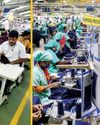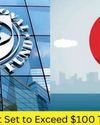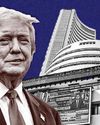Modi may have won the 2019 general election bypassing the economic issues at large but now, arresting an economic slowdown and nursing back the country’s financial sector are among the crucial challenges before the nation.

Indian economy has slowed down to its lowest in five years in the last fiscal and was estimated at 6.8% after a downward revision from government’s estimates of 7% last February. The economy grew at 7.2% in 2017-18.
If the World Bank’s recent projection that India would grow at 7.5% in the next three years, supported by robust investment and private consumption gives some solace to the government, the continuous deceleration in the GDP growth has to be stopped and consumption expenditure in the economy must be boosted. The World Bank, in its Global Economic Prospects released early this month, said that India is estimated to have grown by 7.2% in 2018-19 and is projected to grow 7.5% in 2019-20. “Private consumption and investment will benefit from strengthening credit growth amid more accommodative monetary policy, with inflation having fallen below the Reserve Bank of India’s target,” the report suggested.
The fourth quarter GDP growth at 5.8% was the slowest since 2014-15. The previous low was 6.4% in 2013-14. GDP figures for March quarter also put India behind China's GDP growth rate for the first time in seven quarters. China’s GDP grew at 6.45% in the quarter ended last March.
Agriculture contracted by 0.1% in the fourth quarter against 2.8% growth in the third quarter and 6.5% growth in the corresponding period last year. Manufacturing growth slowed to 3.1% from 6.4% in the trailing quarter.
The question is: What caused this deceleration in GDP growth? According to the finance ministry’s monthly report, “the proximate factors responsible for this slowdown include declining growth of private consumption, tepid increase in fixed investment and muted exports."
Denne historien er fra June 16-30, 2019-utgaven av BUSINESS ECONOMICS.
Start din 7-dagers gratis prøveperiode på Magzter GOLD for å få tilgang til tusenvis av utvalgte premiumhistorier og 9000+ magasiner og aviser.
Allerede abonnent ? Logg på
Denne historien er fra June 16-30, 2019-utgaven av BUSINESS ECONOMICS.
Start din 7-dagers gratis prøveperiode på Magzter GOLD for å få tilgang til tusenvis av utvalgte premiumhistorier og 9000+ magasiner og aviser.
Allerede abonnent? Logg på

Bank of Baroda, Kolkata Zone organised Mega Kisan Melas in West Bengal
Bank of Baroda (BOB) organised Mega Kisan Mela at Konkalitala in Birbhum District of West Bengal on November 18, 2024 as a part of the 7th Edition of the Baroda Kisan Pakhwada (BKP).

Time-Bound Disposal of Cases to Expedite the Delivery of Justice and affordabe by all in India
The delay in the disposal of cases in Indian courts remains a significant hurdle to the nation's progress.

Dev Deepawali: A grand celebration of light, spirituality, and culture in Varanasi
The holy city of Varanasi, often regarded as India's spiritual and cultural heart, came alive with the splendor of Dev Deepawali on the sacred day of Kartik Purnima.

The life of Job 'Ye judge not the judgment of God' - Jesus Christ
The Holy Bible reveals through the life of Job how the Lord tests the righteous and that faith helps one to overcome life's adversities.

India has the highest potential for the garment industry, only a conducive government policy is required.
India's textile industry is poised for remarkable growth, with expectations to double its contribution to the GDP within the next six to seven years.

Global Public Debt may be worse than it appears, warns IMF
Global Public Debt Set to Exceed $100 Trillion, Warns IMF

The economic consequences of Trump's Presidency: A global perspective
One of the key economic factors contributing to the Democrats' loss in the US elections was the significant rise in inflation, which was initially triggered by the COVID-19 pandemic and exacerbated by the Russia-Ukraine war.

Challenges and Successes in West Bengal's Education Sector: A Comprehensive Overview
The education system in West Bengal, particularly in districts, villages, slums, and government institutions, reflects a blend of progress and ongoing challenges.

What India can expect from Trump's return
I may be too early to predict how Donald Trump's second term as president will impact the global oil market.

Stocks Surge Following Donald Trump's Election as 47th President of the USA
Stocks soared following the election of Donald Trump as the 47th President of the United States. Investors anticipated that the Information Technology (IT) sector would benefit from lower corporate taxes under the Republican regime, with IT stocks leading the rally.